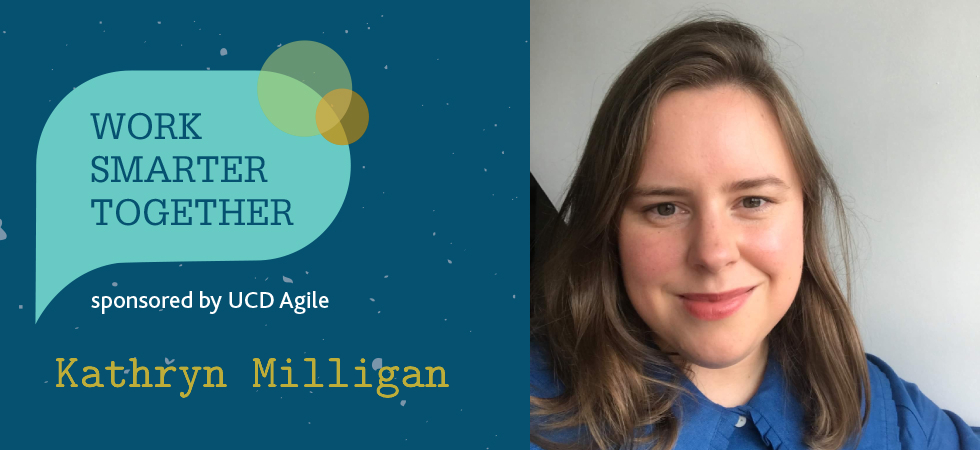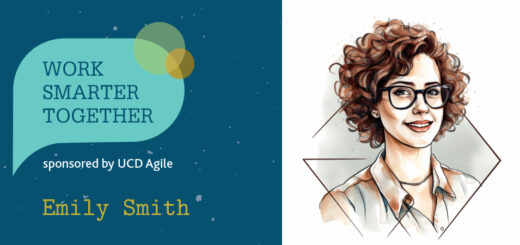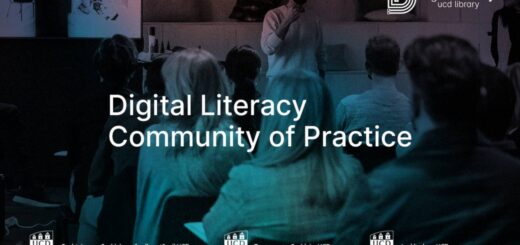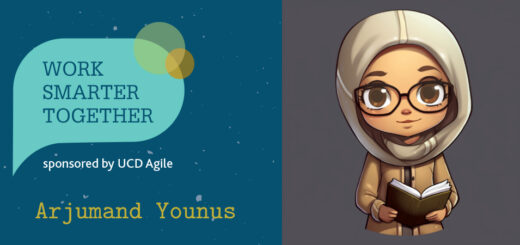A Day in the Life – Kathryn Milligan

Who are you?
I’m Kathryn Milligan and I work as a Library Assistant in UCD Special Collections, one of UCD Library’s three Cultural Heritage units.
How did you get here? What was the journey to UCD?
It all began here! I completed a BA in Art History and English at UCD in 2008, and then spent just under 10 years working in different library settings and completing postgraduate studies in art history. I returned to UCD in 2017 as an Irish Research Council Postdoctoral Fellow with the School of Art History and Cultural Policy, and joined UCD Library in 2020.
What is your role within UCD, and what are your main responsibilities?
As a Library Assistant in Special Collections my main responsibilities include making material available to researchers in the reading room; cataloguing collections and and doing research on our holdings; managing the Special Collections social media accounts; answering enquiries and other day-to-day administration. Could you briefly describe what a typical day looks like for you?
The day starts with a quick check of emails for any new appointments, and then retrieving material for the readers booked on that day. There will be some reshelving from the previous day’s appointments, working in our climate controlled stores to make sure everything is where it needs to be.
Often during the teaching terms there will be a class booked to look at a range of materials relating as part of their module, and this is always a great opportunity to show off our collections and highlight how they can contribute to teaching and learning in the university. The quieter summer months can be an opportunity for catching up with cataloguing and other collections-based work.
There will always be some work to do for our busy Twitter and Instagram accounts, tying in things like events or anniversaries, for example. I also manage the UCD Cultural Heritage blog, which publishes a new post every two weeks. These are written by staff across Special Collections, UCD Archives, and the National Folklore Collection, and is another way to showcase our collections to a wider audience.
What are some of the most interesting or challenging tasks you encounter on a regular basis? Why are they unavoidable?
A key part of our job is helping readers – be they undergraduates or experienced researchers – navigate the collections and access the material they need. On a busy day in the middle of a teaching term it can be difficult to give each reader the support they need, recognising that things we think are obvious or clear might not be for someone using Special Collections for the first time, for example. Finding the time and patience to assist however, bears rich rewards and reminds us of the importance of our role in a student’s educational journey.
Are there any specific projects or initiatives you or your unit are currently working on that you would like to share?
I would encourage everyone to come and visit the ‘Heaney & the Classics’ exhibition this summer. It really does have something for everyone: no matter whether you have a deep knowledge of the classics or are a novice; a Heaney fan or someone who hasn’t engaged with his work since school; or simply a lover of beautifully designed books. There’s something for everyone!
Is there a process or element of your work that you would improve or change?
Not at the moment! We’ve recently updated some of our systems for taking reading room bookings and managing our statistics, and so far, so good.
Could you share a memorable experience you’ve had while working in your role?
One of the joys of working in UCD Special Collections is that we are involved in the Irish Poetry Reading Archive project, which sees poets come to the reading room and record videos that are later added to YouTube and the UCD Digital Library. Recently, the current Irish Professor of Poetry Paul Muldoon came to record a newly commissioned work as part of Poetry as Commemoration, and being able to hear him read his work to a very small audience of Special Collections staff was a privilege.
Is there a particular skill or expertise that helps you in your role and what advice would you give to someone joining your unit?
Having expertise in an allied subject area (art history) has been very important in developing a specialisation within my role, for example working on cataloguing fine print collections and the different print and other craft techniques across our holdings.
If you are thinking of a library-based career, it is always useful to speak to different staff about their backgrounds or qualifications, and look into the activities of professional groups, such as the Library Association of Ireland.
How do you collaborate with other teams or colleagues in your day-to-day work?
Within Special Collections, we work continually as a team to retrieve and reshelve material for readers, to meet with readers and answer questions, and to keep everything running smoothly in general. I also frequently liaise with staff in the other Cultural Heritage units, and with my wider Library colleagues through internal committee work.
Are there any common misconceptions about your role?
Of course! It’s often thought that library staff get plenty of time to read as they work, but our aim is to make the holdings available to our users as soon as possible. Thinking more specifically about working with special collections, you would be hard pressed to find a pair of white cotton gloves here (clean hands or nitrile gloves are preferred) and our archives certainly aren’t ‘dusty’!
How do you see your job changing over the next ten or twenty years?
I think that while some of our systems and day-to-day work will change with new technology, there will also be an increasing awareness and appreciation of the physical and in-person connection with cultural heritage collections. Whether that’s viewing the personal archives of literary figures, learning more about book crafts or handwritten manuscripts, the experience of encountering the past in a very real and sensory way will offer something different to our online world. I also hope that we continue to expand access to cultural heritage collections with audiences and communities beyond the university.
What is an achievement big or small you’ve had while in this role?
In the summer of 2022 I catalogued a new donation of books and other materials relating to Seamus Heaney, which came to Special Collections through the generosity of Joseph M. Hassett. This was the first time I was responsible for cataloguing an entire collection, adding them to both the system that most UCD Library users use and producing a longer print catalogue, documenting each book in detail. From this work, we went on to work with Joseph Hassett on an exhibition ‘Seamus Heaney & the Classics’, which opened in April. Seeing a full turn out for the launch and visitors’ enthusiastic responses to the exhibition and the books is very rewarding, knowing how much work went into both projects!
If your job had a theme song or soundtrack, what would it be [and why]?
Definitely something like John Coltrane and Duke Ellington’s ‘In a sentimental mood’. There’s always movement, sometimes frenetic, sometimes calm, with the added beat and thrum of the main library and university campus circling around us.



